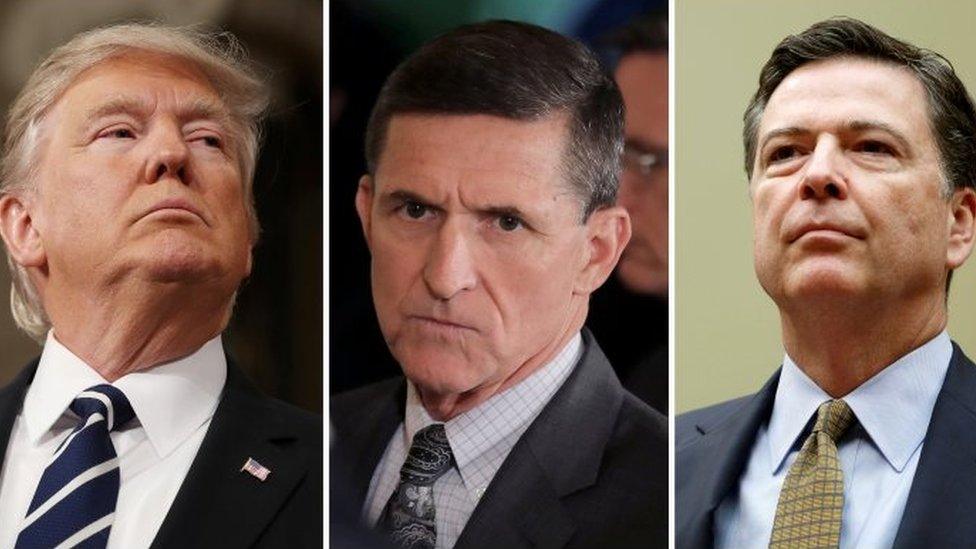Trump addresses Congress: A kinder, gentler president
- Published
President Trump: "What we are witnessing today is the renewal of the American spirit"
At least for one night, Donald Trump put aside the bombast and bellicosity of a campaign that seemed to bleed into his presidency. On a presidential stage, he acted and sounded not unlike presidents of the past. Presidential, even.
In his first address to a joint session of Congress, after a tumultuous first month in office, Mr Trump delivered a conventional speech in a conventional manner. That it was unexpected, and that the bar for success was knee-high at best, is life in the age of Trump.
Yes, much of the content was the same - the calls for a border wall, the (unfounded) allegations that undocumented immigrants are prone to crime, the full-throated exposition of an "America first" economic nationalism and the warning that US allies must pay their fair share - but the delivery was smooth and polished.
There was a moment before the speech when cameras captured Mr Trump in his armoured limousine, rehearsing his lines. Practice, it seems, made good, if not perfect. For once, Donald Trump's delivery was spoken, not shouted. He appeared poised, not petulant; forceful, not forced.
President Trump: "Real and positive immigration reform is possible"
As this was largely a traditionally crafted speech, there were some painful cliches and political pabulum to which a typical politician might be prone, of course.
The line "we just need the courage to share the dreams that fill our hearts, the bravery to express the hopes that stir our souls and the confidence to turn those hopes and dreams to action" likely induced cringes from high-school English teachers across the nation.
Also typical of such addresses was a text light on policy, touching on most of Mr Trump's agenda in vague generalities. There were several key moments that defined his speech, however, which could have a lasting impact.

Healthcare details
After spending a few paragraphs blasting Obamacare, including motioning directly at the Democrats during his sharpest condemnations, the president laid down a few markers for what he wanted to see replace the current system.
Americans with pre-existing medical conditions should be able to get coverage. The transition from the current government-exchange system of insurance for those who don't have employer-based health insurance must be "stable". Insurance subsidies should be morphed into tax credits and health savings accounts, which let Americans put aside tax-free dollars for medical expenses.
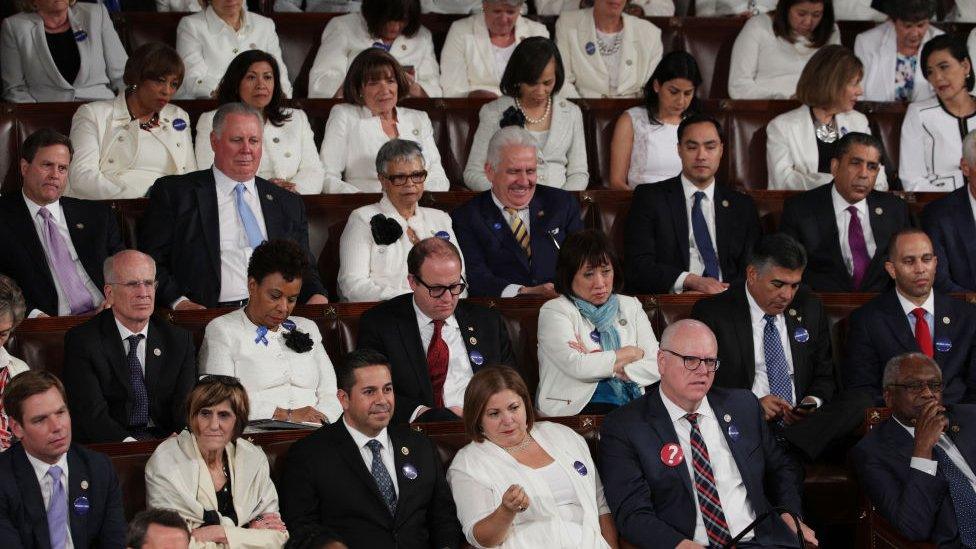
Democrats in Congress were not impressed by Donald Trump's healthcare reform ideas
States need the "resources and flexibility" to provide insurance for the poor. Drug prices must go down, and doctors should have greater legal protections. Provisions preventing the purchase of insurance across state lines - which allow places like California to more stringently regulate their insurance industries - should be repealed.
All of those provisions will be resisted by Democrats. A few will be questioned by some Republicans. For the first time, however, the president has staked out ground in the fight.
If his detailing was productive, it was somewhat undermined by a final, typical Trumpian flourish of pie-in-the-sky rhetoric.
"Everything that is broken in our country can be fixed," he said. "Every problem can be solved. And every hurting family can find healing and hope."
Just a few days earlier, the president had remarked that "nobody knew that healthcare could be so complicated". Now he's promising rainbows and unicorns.
The Republicans in Congress have their work cut out for them.

The grieving widow
It was easily the most moving portion of evening. It may also end up being one of the most contentious.
The president, toward the end of his speech pointed to Carryn Owens, the widow of US soldier Ryan Owens, who was killed during a commando raid in Yemen just days after Mr Trump took office. As the Congress applauded the grieving woman, Mr Trump said her husband's "legacy is etched into eternity".
Carryn Owens, the widow of fallen Navy Seal, Ryan Owens, is brought to tears
As a standalone moment, it was powerful. Viewed in the context of an ongoing controversy over the overall success and wisdom of the raid, which resulted in 25 civilian casualties including nine children (one of whom was a US citizen), the moment becomes infused with politics.
Mr Trump quoted his Defence Secretary, James Mattis, as saying the raid produced "vital intelligence" - although earlier news reports, external indicated that was not the case.
Arizona Senator John McCain has called the operation a failure, and the slain soldier's father, William Owens, refused to meet with president and called for a formal investigation into the incident. Earlier on Tuesday, Mr Trump appeared to lay the blame for Owens' death at the feet of the military.
"They came to see me, and they explained what they wanted to do," he said. "My generals are the most respected that we've had in many decades, I believe, and they lost Ryan."
By highlighting the raid, and putting a spotlight on Carryn Owens, the president has offered a high-profile response to the criticisms.
The move may only lead to greater scrutiny and sharper questioning, however.

Big money
During his 1996 State of the Union Address, Bill Clinton asserted that the era of big government was over.
Toward the end of his speech on Tuesday, Donald Trump said it was the "time for small thinking" that was over.
Big government, it seems, is making a comeback.
Defence spending, as promised last week, is headed for a $54bn boost. Now Mr Trump has revealed the size of his planned infrastructure programme, and it's a whopping $1 trillion.
Although he said that some of the amount would be funded by "private capital" (an idea that has some Democrats fearful of corruption or abuse), the goal is still remarkable and the impact on the public purse will surely be sizeable.
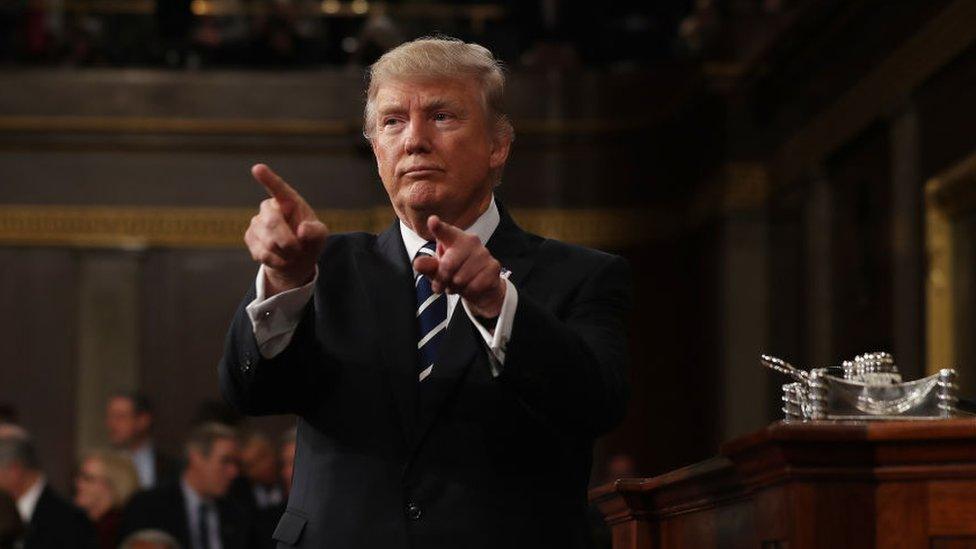
Throw in Mr Trump's promise of a "great, great wall along our southern border" - with estimates starting at $12bn - and "massive tax relief for the middle class", and the price tag for his speech proposals is on an express elevator to astronomical.
"Cures to illnesses that have always plagued us are not too much to hope," Mr Trump said. "American footprints on distant worlds are not too big a dream. Millions lifted from welfare to work is not too much to expect. And streets where mothers are safe from fear - schools where children learn in peace - and jobs where Americans prosper and grow - are not too much to ask."
Nowhere in the president's speech, however, was there mention of how these programmes would be financed. While the Trump officials spoke of cuts to federal agencies and departments last week, talk of "tough choices" was notably absent on Tuesday night.
The only reference to the national debt - the reduction of which was once a top priority for Republicans of all stripes - was a passing mention of the subject during a litany of Barack Obama's economic failings.
Back in the early days of the George W Bush administration, Vice-President Dick Cheney memorably said "deficits don't matter". After an eight-year absence, those days are here again.

Calls for unity
Back in the early hours of 9 November, as he took the stage to claim his improbable presidential victory, Donald Trump issued a call for national unity and healing.
"Now is the time to bind the wounds of division," he said. "I say to Democrats and Republicans it is time to come together as one united people."
Since that moment, Mr Trump has seemed more attuned to the needs and desires of his core base of supporters, and less interested in reaching out to Democrats and independents.
In his inaugural address, the new president railed against the establishment, many of whom were seated uncomfortably behind him.
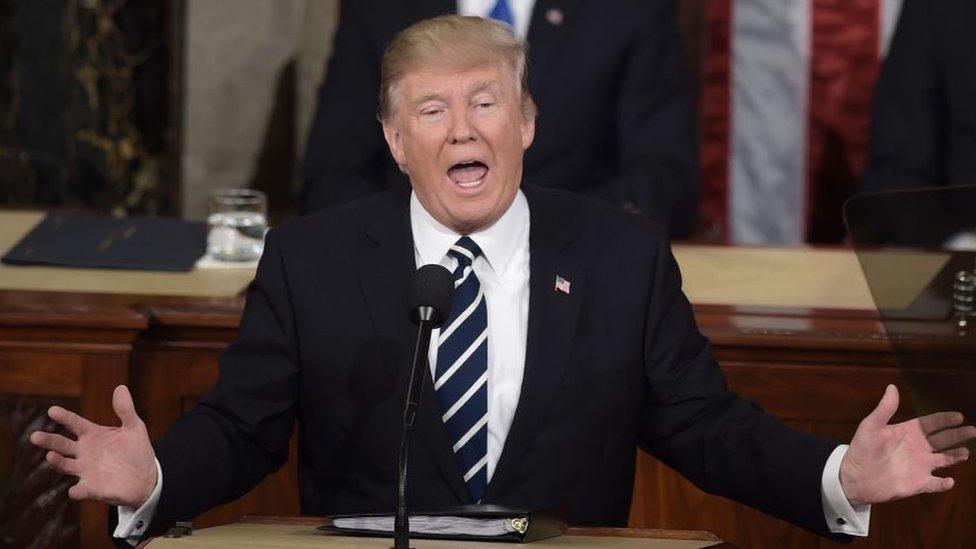
In his first month in office, the president has been mostly confrontational in word and deed.
Then, on Tuesday night, his November rhetoric resurfaced at last.
"Democrats and Republicans should get together and unite for the good of our country, and for the good of the American people," the president said.
Perhaps it's a reflection of a change in strategy. Perhaps it's a recognition that he will need at least some Democratic support in Congress if he wants to pass the more ambitious portions of his legislative agenda.
On immigration in particular, the change of tone was jarring, even from within the speech itself. Amidst warning of the threats posed by illegal immigration to jobs and safety, the president seemingly extended an olive branch to his opponents.
"I believe that real and positive immigration reform is possible, as long as we focus on the following goals: to improve jobs and wages for Americans, to strengthen our nation's security, and to restore respect for our laws," he said. "If we are guided by the well-being of American citizens, then I believe Republicans and Democrats can work together to achieve an outcome that has eluded our country for decades."
Earlier in the day Trump himself had told journalists - on background - that he was open to providing normalised status for undocumented immigrants who had committed no serious crime, which would represent a significant reversal from past statements. He didn't go nearly as far in his speech, but the door was opened.
It could, of course, slam shut tomorrow, and all the talk of unity could vanish in a flurry of tweets.
- Published15 February 2017
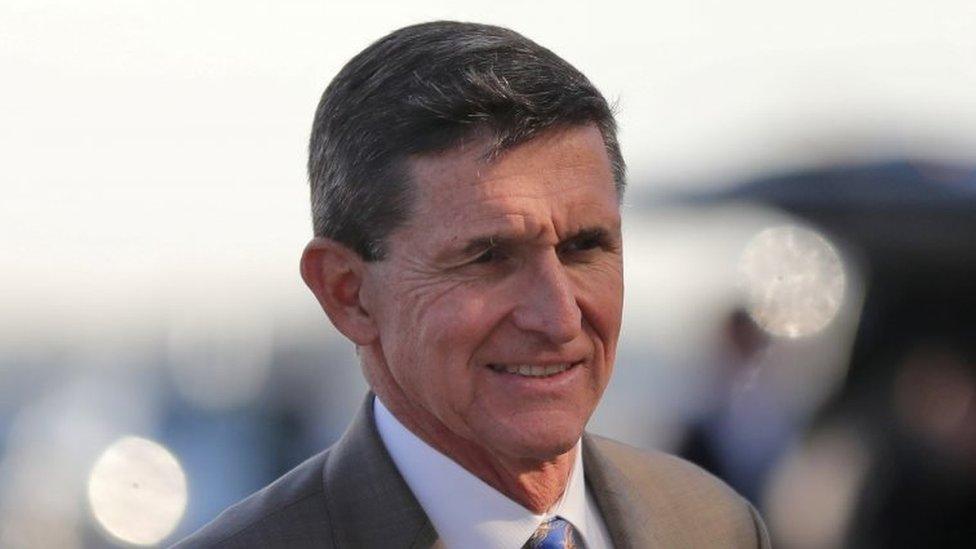
- Published14 September 2018

- Published12 July 2017
